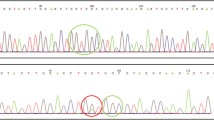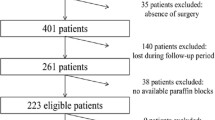Abstract
Purpose
Mutations in KRAS and BRAF genes were associated with treatment failure from EGF receptor inhibitors in colorectal cancer (CRC) patients. However, whether these mutations were associated with survival in patients not treated with EGF receptor inhibitors remained controversial. Moreover, few data were available in Chinese. Therefore, we aimed to evaluate the impact of KRAS and BRAF mutations on the survival of Chinese CRC patients.
Methods
CRC patients who underwent surgery between October 2003 and April 2006 were included in this study. They were observed until June 30, 2010 or when death was ascertained by the National Death Registration System. Prospectively collected fresh frozen tumor tissues were used for detection of mutations at codons 12, 13, and 61 of the KRAS gene and exons 11 and 15 of BRAF gene by PCR amplification followed by direct sequencing.
Results
Among the 314 patients, KRAS and BRAF mutations were detected in 65 (20.7%) and 12 (3.8%) patients, respectively. KRAS mutations appeared to occur more frequently in females than males (p = 0.039) and in non-smokers (p = 0.039). KRAS and BRAF mutations were significantly associated with the proximal location of cancer (p = 0.017 and 0.001, respectively). In the univariate analysis, KRAS and BRAF mutations were not associated with survival. However, BRAF mutations were associated with a significantly worse overall survival (hazard ratio = 3.91, 95% confidence interval 1.31 to 11.66, p = 0.014) in the multivariate Cox proportional hazard model after adjustment for all direct clincopathological variables.
Conclusion
BRAF mutations, but not KRAS mutations, were associated with a worse outcome in Chinese CRC patients.

Similar content being viewed by others
References
Sung JJ, Lau JY, Young GP et al (2008) Asia Pacific consensus recommendations for colorectal cancer screening. Gut 57:1166–1176
Jass JR (2007) Classification of colorectal cancer based on correlation of clinical, morphological and molecular features. Histopathology 50:113–130
Walther A, Johnstone E, Swanton C, Midgley R, Tomlinson I, Kerr D (2009) Genetic prognostic and predictive markers in colorectal cancer. Nat Rev Cancer 9:489–499
McCubrey JA, Steelman LS, Abrams SL et al (2006) Roles of the RAF/MEK/ERK and PI3K/PTEN/AKT pathways in malignant transformation and drug resistance. Adv Enzyme Regul 46:249–279
Rajagopalan H, Bardelli A, Lengauer C, Kinzler KW, Vogelstein B, Velculescu VE (2002) Tumorigenesis: RAF/RAS oncogenes and mismatch-repair status. Nature 418:934
Yuen ST, Davies H, Chan TL et al (2002) Similarity of the phenotypic patterns associated with BRAF and KRAS mutations in colorectal neoplasia. Cancer Res 62:6451–6455
Noda H, Kato Y, Yoshikawa H et al (2006) Frequent involvement of ras-signalling pathways in both polypoid-type and flat-type early-stage colorectal cancers. J Exp Clin Cancer Res 25:235–242
Rosenberg DW, Yang S, Pleau DC et al (2007) Mutations in BRAF and KRAS differentially distinguish serrated versus non-serrated hyperplastic aberrant crypt foci in humans. Cancer Res 67:3551–3554
Di Nicolantonio F, Martini M, Molinari F et al (2008) Wild-type BRAF is required for response to panitumumab or cetuximab in metastatic colorectal cancer. J Clin Oncol 26:5705–5712
Siddiqui AD, Piperdi B (2010) KRAS mutation in colon cancer: a marker of resistance to EGFR-I therapy. Ann Surg Oncol 17:1168–1176
Siena S, Sartore-Bianchi A, Di Nicolantonio F, Balfour J, Bardelli A (2009) Biomarkers predicting clinical outcome of epidermal growth factor receptor-targeted therapy in metastatic colorectal cancer. J Natl Cancer Inst 101:1308–1324
Andreyev HJ, Norman AR, Cunningham D, Oates JR, Clarke PA (1998) Kirsten ras mutations in patients with colorectal cancer: the multicenter "RASCAL" study. J Natl Cancer Inst 90:675–684
Andreyev HJ, Norman AR, Cunningham D et al (2001) Kirsten ras mutations in patients with colorectal cancer: the 'RASCAL II' study. Br J Cancer 85:692–696
Nash GM, Gimbel M, Shia J et al (2010) KRAS mutation correlates with accelerated metastatic progression in patients with colorectal liver metastases. Ann Surg Oncol 17:572–578
Nash GM, Gimbel M, Cohen AM et al (2010) KRAS mutation and microsatellite instability: two genetic markers of early tumor development that influence the prognosis of colorectal cancer. Ann Surg Oncol 17:416–424
Ogino S, Nosho K, Kirkner GJ et al (2009) CpG island methylator phenotype, microsatellite instability, BRAF mutation and clinical outcome in colon cancer. Gut 58:90–96
Samowitz WS, Sweeney C, Herrick J et al (2005) Poor survival associated with the BRAF V600E mutation in microsatellite-stable colon cancers. Cancer Res 65:6063–6069
Barault L, Charon-Barra C, Jooste V et al (2008) Hypermethylator phenotype in sporadic colon cancer: study on a population-based series of 582 cases. Cancer Res 68:8541–8546
English DR, Young JP, Simpson JA et al (2008) Ethnicity and risk for colorectal cancers showing somatic BRAF V600E mutation or CpG island methylator phenotype. Cancer Epidemiol Biomark Prev 17:1774–1780
Kumar K, Brim H, Giardiello F et al (2009) Distinct BRAF (V600E) and KRAS mutations in high microsatellite instability sporadic colorectal cancer in African Americans. Clin Cancer Res 15:1155–1161
Lee X, Gao M, Ji Y et al (2009) Analysis of differential BRAF (V600E) mutational status in high aggressive papillary thyroid microcarcinoma. Ann Surg Oncol 16:240–245
Elisei R, Ugolini C, Viola D et al (2008) BRAF(V600E) mutation and outcome of patients with papillary thyroid carcinoma: a 15-year median follow-up study. J Clin Endocrinol Metab 93:3943–3949
Ito Y, Yoshida H, Maruo R et al (2009) BRAF mutation in papillary thyroid carcinoma in a Japanese population: its lack of correlation with high-risk clinicopathological features and disease-free survival of patients. Endocr J 56:89–97
Lee EJ, Choi C, Park CK et al (2005) Tracing origin of serrated adenomas with BRAF and KRAS mutations. Virchows Arch 447:597–602
Lindblom A (2001) Different mechanisms in the tumorigenesis of proximal and distal colon cancers. Curr Opin Oncol 13:63–69
Barault L, Veyrie N, Jooste V et al (2008) Mutations in the RAS-MAPK, PI(3)K (phosphatidylinositol-3-OH kinase) signaling network correlate with poor survival in a population-based series of colon cancers. Int J Cancer 122:2255–2259
Benvenuti S, Frattini M, Arena S et al (2008) PIK3CA cancer mutations display gender and tissue specificity patterns. Hum Mutat 29:284–288
Roth AD, Tejpar S, Delorenzi M et al (2010) Prognostic role of KRAS and BRAF in stage II and III resected colon cancer: results of the translational study on the PETACC-3, EORTC 40993, SAKK 60–00 trial. J Clin Oncol 28:466–474
Weijenberg MP, Aardening PW, de Kok TM, de Goeij AF, van den Brandt PA (2008) Cigarette smoking and KRAS oncogene mutations in sporadic colorectal cancer: results from the Netherlands Cohort Study. Mutat Res 652:54–64
Samowitz WS, Albertsen H, Sweeney C et al (2006) Association of smoking, CpG island methylator phenotype, and V600E BRAF mutations in colon cancer. J Natl Cancer Inst 98:1731–1738
French AJ, Sargent DJ, Burgart LJ et al (2008) Prognostic significance of defective mismatch repair and BRAF V600E in patients with colon cancer. Clin Cancer Res 14:3408–3415
Kakar S, Deng G, Sahai V et al (2008) Clinicopathologic characteristics, CpG island methylator phenotype, and BRAF mutations in microsatellite-stable colorectal cancers without chromosomal instability. Arch Pathol Lab Med 132:958–964
Lee S, Cho NY, Choi M, Yoo EJ, Kim JH, Kang GH (2008) Clinicopathological features of CpG island methylator phenotype-positive colorectal cancer and its adverse prognosis in relation to KRAS/BRAF mutation. Pathol Int 58:104–113
Zlobec I, Bihl MP, Schwarb H, Terracciano L, Lugli A (2010) Clinico-pathological and protein characterization of BRAF and K-RAS mutated colorectal cancer and implications for prognosis. Int J Cancer 127:367–380
Richman SD, Seymour MT, Chambers P et al (2009) KRAS and BRAF mutations in advanced colorectal cancer are associated with poor prognosis but do not preclude benefit from oxaliplatin or irinotecan: results from the MRC FOCUS trial. J Clin Oncol 27:5931–5937
Maestro ML, Vidaurreta M, Sanz-Casla MT et al (2007) Role of the BRAF mutations in the microsatellite instability genetic pathway in sporadic colorectal cancer. Ann Surg Oncol 14:1229–1236
Yoshitake N, Fujii S, Mukawa K et al (2007) Mutational analysis of the BRAF gene in colorectal mucinous carcinoma in association with histological configuration. Oncol Rep 17:9–15
Preto A, Figueiredo J, Velho S et al (2008) BRAF provides proliferation and survival signals in MSI colorectal carcinoma cells displaying BRAF(V600E) but not KRAS mutations. J Pathol 214:320–327
Samowitz WS, Curtin K, Schaffer D, Robertson M, Leppert M, Slattery ML (2009) Relationship of Ki-ras mutations in colon cancers to tumor location, stage, and survival: a population-based study. Cancer Epidemiol Biomark Prev 9:1193–1197
Wang C, van Rijnsoever M, Grieu F et al (2003) Prognostic significance of microsatellite instability and Ki-ras mutation type in stage II colorectal cancer. Oncology 64:259–265
Liang JT, Cheng YM, Chang KJ, Chien CT, Hsu HC (1999) Reappraisal of K-ras and p53 gene mutations in the recurrence of Dukes’ B2 rectal cancer after curative resection. Hepatogastroenterology 46:830–837
Italiano A, Hostein I, Soubeyran I et al (2010) KRAS and BRAF mutational status in primary colorectal tumors and related metastatic sites: biological and clinical implications. Ann Surg Oncol 17:1429–1434
Acknowledgment
As for financial support, Jyh-Ming Liou received research grants from the National Taiwan University, College of Medicine (grant number: NTU-99R3110002). Jyh-Ming Liou and Ming-Shiang Wu contributed equally to this work. All the authors do not have conflict of interest to be declared in this work. We would like to express our special thanks to the staff of the Eighth Core Lab, Department of Medical Research, National Taiwan University Hospital for the technical support during the study.
Author information
Authors and Affiliations
Corresponding author
Rights and permissions
About this article
Cite this article
Liou, JM., Wu, MS., Shun, CT. et al. Mutations in BRAF correlate with poor survival of colorectal cancers in Chinese population. Int J Colorectal Dis 26, 1387–1395 (2011). https://doi.org/10.1007/s00384-011-1229-1
Accepted:
Published:
Issue Date:
DOI: https://doi.org/10.1007/s00384-011-1229-1




